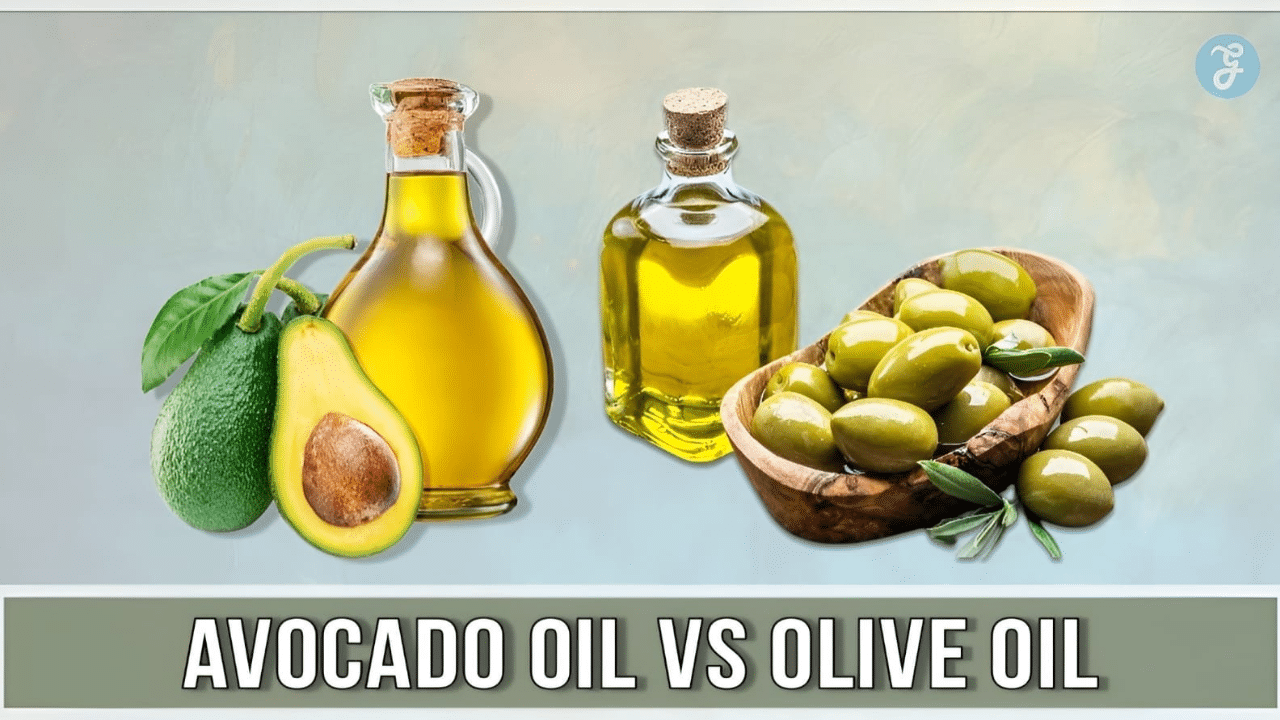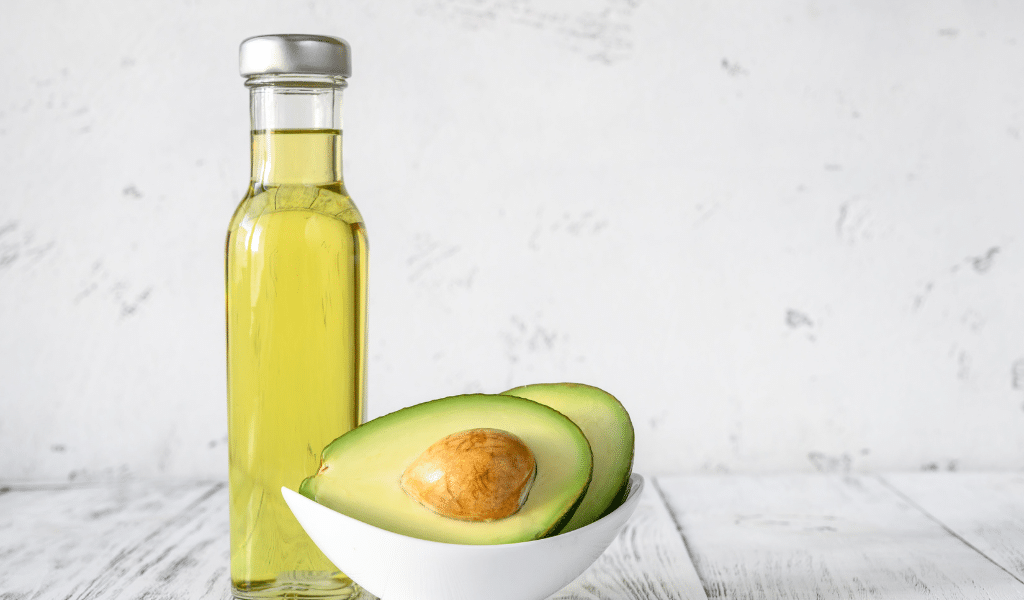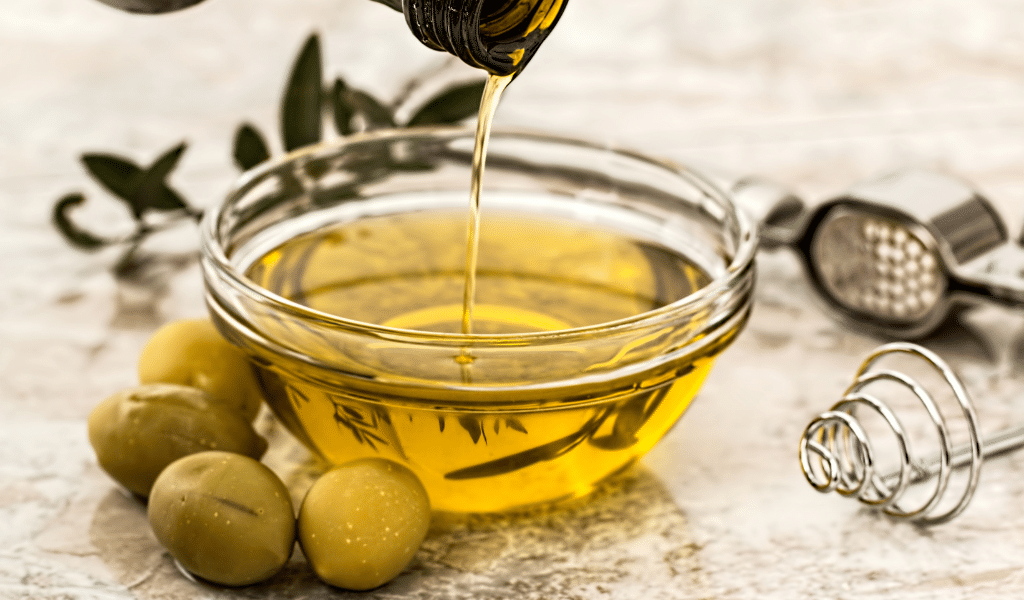Are you torn between choosing avocado oil vs olive oil? Both oils have their own unique qualities and culinary benefits, making it challenging to determine which one is the best fit for your needs.
Avocado oil is the preferred choice for roasting due to its higher smoke point, while neither avocado oil nor olive oil is ideal for deep frying due to cost considerations. Avocado oil takes the lead for stir-frying, while olive oil is the preferred option for sautéing.
To help you make an informed decision, let’s delve into the characteristics and recommended uses of avocado oil and olive oil.
What is Avocado Oil?
Avocado oil is derived from the fruit of the avocado tree through a process that involves pressing the peeled and de-pitted avocado. This extraction method is explained by registered dietitian Maggie Michalczyk, R.D. The pulp of the avocado is subjected to heating and filtering to obtain the oil.
When avocado oil is labeled as “cold-pressed” or “cold-extracted,” it indicates that the oil was obtained without the use of heat or chemical solvents during the crushing and extraction of the oil from the avocado seeds. This distinction is significant because the absence of heat in the extraction process helps preserve the nutrient content of the oil.
Avocado oil is known for its nutritional richness and is valued for its health benefits. It contains monounsaturated fats, which are considered heart-healthy fats. Additionally, avocado oil is a good source of vitamin E, an antioxidant that helps protect cells from damage caused by free radicals.
With its mild and subtle flavor, avocado oil is versatile and can be used in various culinary applications. It is often used in salad dressings, marinades, and as a cooking oil due to its high smoke point, making it suitable for high-temperature cooking methods.
In summary, avocado oil is a nutrient-rich oil obtained through the pressing and filtration of avocado pulp. Its cold-pressed or cold-extracted varieties retain more nutrients, making it a popular choice for cooking and enjoying the health benefits it offers.
Avocado Oil Nutrition Fact
Here’s the table for the nutritional information of avocado oil per 1 tablespoon (Tbsp) serving: (Collected from Good House Keeping)
|
Nutrient |
Amount |
|
Calories |
124 |
|
Total fat |
14 g |
|
Saturated fat |
1.6 g |
|
Protein |
0 g |
|
Fiber |
0 g |
|
Sodium |
0 mg |
What is Olive Oil?
Olive oil is a type of oil that is produced through a similar process to avocado oil, as explained by registered dietitian Catherine Perez, R.D. However, there are some notable differences in the production methods. Unlike avocado oil, where the skin and seed of the avocado are removed before pressing, olive oil undergoes multiple pressing and separation processes. The olives are pressed into a pulp, heated, and filtered to extract the oil.
If necessary, the oil can undergo further chemical processing and deodorization to refine its appearance and flavor. Similar to avocado oil, cold-pressed or cold-extracted olive oils are available, which tend to be more nutrient-rich compared to those produced using heat.
When browsing for olive oil, you may come across labels such as “virgin” or “extra-virgin.” So, what sets them apart? According to Perez, extra-virgin olive oil is less processed than virgin olive oil. It possesses a stronger flavor and retains a higher amount of nutrients due to undergoing less processing.
Olive Oil Nutrition Fact
Here’s a table representing the nutritional information for a serving size of 1 tablespoon of the given product. (Collected from Good House Keeping)
|
Nutrient |
Amount |
|
Calories |
120 |
|
Total Fat |
14 g |
|
Saturated Fat |
2.5 g |
|
Fiber |
0 g |
|
Protein |
0 g |
|
Sodium |
0 g |
Similarities Between Avocado Oil And Olive Oil
Avocado oil and olive oil have several things in commotion. Let’s check them out.
Heart Health
Both oils are high in unsaturated fatty acids, which are beneficial for heart health. Research suggests that replacing saturated fats with unsaturated fats can lower the risk of heart disease and other chronic conditions. Consuming avocado oil and olive oil has been linked to lower LDL cholesterol and blood pressure levels.
Brain Health
Regular consumption of avocado oil and olive oil supports brain health. The presence of unsaturated fats and antioxidants in these oils contributes to their beneficial effects. Scientific reviews have shown that regularly consuming extra-virgin olive oil can prevent and even halt the progression of Alzheimer’s disease. Due to its structural similarity to olive oil, avocado oil may also provide similar brain health benefits.
Skin Health
Avocado oil and olive oil are beneficial for skin health. They are both rich in antioxidants and healthy fats that nourish and moisturize the skin. These oils can help improve skin elasticity, reduce dryness, and protect against oxidative damage. Regularly applying avocado oil or olive oil topically can promote healthy skin and provide a natural glow.
Culinary Versatility
Both avocado oil and olive oil are versatile in the kitchen. They can be used for various cooking methods, including sautéing, frying, roasting, and baking. Their mild flavors make them suitable for different types of dishes, from salads and dressings to marinades and sauces. Additionally, both oils have high smoke points, which means they can withstand higher cooking temperatures without breaking down and releasing harmful compounds.
Gut Health
Both avocado oil and olive oil promote gut health. Studies have demonstrated that extra-virgin olive oil increases the amount of beneficial bacteria in the gut, benefiting overall gut health. Avocado oil contains similar nutrients, making it beneficial for the gut as well.
Eye Health
Avocado oil and olive oil both contain lutein, an antioxidant associated with protecting the eyes. Scientific studies have shown that lutein has anti-inflammatory properties and can help prevent age-related macular disease, which is linked to vision impairment and blindness. Drizzling avocado or olive oil on leafy greens, cooked squash, or eggs can further increase your lutein intake and support eye health.
Lowering Inflammation
The antioxidants present in avocado oil and olive oil are known to help prevent or reduce chronic inflammation. Chronic inflammation can lead to various diseases, including certain types of cancer. Consuming these oils may contribute to lowering inflammation levels and promoting overall health.
Read Also: Common health problems after 40
Differences Between Avocado Oil vs Olive Oil
Now let’s see, How avocado oil and olive oil are different from each other
Variation in Vitamin E Content
While both oils contain the antioxidant vitamin E, there is a slight difference in the amount present. Olive oil is generally higher in vitamin E compared to avocado oil. Vitamin E is known for its benefits to skin health, as it helps protect against UV exposure. However, apart from this disparity, the overall nutritional profiles of the oils do not significantly differ.
Smoke Point Discrepancy
Avocado oil has a higher smoke point than olive oil, making it more suitable for high-temperature cooking methods. When sautéing, roasting, or baking, using avocado oil is recommended due to its ability to withstand higher heat without breaking down. However, if olive oil is the only option available, it can still be used for high-temperature cooking, as both oils have relatively high smoke points. The smoke point of avocado oil is approximately 482℉, while extra-virgin olive oil has a smoke point of around 376℉.
Taste Profiles
Avocado oil possesses a more neutral taste compared to olive oil. If you prefer an oil that won’t significantly alter the flavor of your food, choosing avocado oil is a good option. It has a mild and slightly nutty flavor. On the other hand, olive oils can vary in taste, with many having bolder and sometimes peppery flavors. The distinct taste of olive oil can often enhance the flavors of dishes, adding an extra layer of complexity to the food.”
Fatty Acid Composition
Avocado oil and olive oil differ in their fatty acid composition. Avocado oil primarily consists of monounsaturated fats, particularly oleic acid, which is known for its heart-healthy benefits. On the other hand, olive oil contains a mix of monounsaturated and polyunsaturated fats, including both oleic acid and linoleic acid. The variation in fatty acid composition gives each oil unique nutritional properties and potential health benefits.
Culinary Applications
Due to its higher smoke point, avocado oil is preferred for high-heat cooking methods such as frying and grilling. It can withstand the higher temperatures without producing smoke or breaking down. Olive oil, especially extra-virgin olive oil, is often used for drizzling, dressing, and low to medium-heat cooking methods like sautéing and baking. Its distinct flavor and aroma make it a popular choice for salad dressings, marinades, and enhancing the taste of various dishes.
Avocado Oil vs Olive Oil: Taste Comparison
Below We’re going to learn about the taste comparison between Avocado oil and Olive oil.
Avocado Oil’s Neutral and Versatile Flavor
According to Dena Champion, a registered dietitian from the Ohio State University Wexner Medical Center, avocado oil has a neutral taste and doesn’t impart much flavor to dishes. This quality allows the natural flavors of the food being cooked to shine, making it suitable for a wide range of recipes, including bread and baked goods.
High-quality, unrefined, or extra-virgin avocado oil can have a buttery and mushroom-like flavor with subtle grassy notes, making it ideal for simple dressings and as a finishing oil for roasted vegetables. Refined avocado oil has a milder taste, which complements any dish without overpowering it.
Olive Oil’s Strong and Savory Flavor
Olive oil has a stronger flavor typically associated with savory foods. The presence of oleocanthal, a powerful polyphenol antioxidant, gives high-quality, extra-virgin olive oils a slight spicy taste
This astringent, bitter, or peppery flavor makes unrefined or extra-virgin olive oil a good choice for simple dressings, drizzling over seared meat or roasted veggies, salads, pasta, and as a dip for bread. The flavor of olive oil becomes milder as it is refined, with lower polyphenol content. Refined olive oil works well in salad dressings and pasta sauces.
Avocado Oil vs Olive Oil: Usage Comparison
Avocado oil has a slightly higher smoke point than olive oil, meaning it can tolerate higher temperatures before breaking down and releasing free radicals. This makes it suitable for sautéing, roasting, and even baking. Avocado oil can withstand temperatures up to about 520 degrees Fahrenheit, while the smoke point of olive oil ranges from 350 to 410 degrees Fahrenheit, depending on its refinement level.
Generally, higher-quality oils have lower smoke points, as they are more delicate. Heating less refined oils beyond their smoke point can lead to the quicker release of free radicals. It’s important to consider the quality of the oil and its intended usage when determining the appropriate temperature for cooking.
Avocado Oil vs Olive Oil: Cost Comparison
Avocado oil is generally more expensive than olive oil due to the higher production costs associated with avocados. The price difference can vary depending on the type and level of processing.
While it’s possible to find both expensive and affordable options for both avocado and olive oil, avocado oil tends to be about 50% higher in price compared to olive oil of similar quantity and quality. However, investing in high-quality avocado or olive oil is recommended for optimal taste and health benefits.
Avocado Oil vs Olive Oil: The Best Option for Cooking
Despite common beliefs, olive oil is relatively stable at high heat and can be used for most frying endeavors. Our olive oil has a smoke point of over 400 degrees F (note that fresher olive oil will have a higher smoke point), making it perfectly suitable for cooking purposes. If you prefer even higher heat, refined avocado oil offers a slightly higher smoke point of 520 degrees F, providing another great option for high-temperature cooking. Both olive oil and refined avocado oil are excellent choices when you need to bring on the heat in your cooking.
Avocado Oil vs Olive Oil: In Different Cooking Functions
This is an important segment. Now we’ll learn how they work for different cooking functions.
|
Cooking Function |
Preferred Choice |
Alternative Choice |
|
Roasting |
Avocado Oil |
Olive Oil |
|
Deep Frying |
Neither |
Canola Oil |
|
Stir-Frying |
Avocado Oil |
Olive Oil |
|
Sautéing |
Olive Oil |
– |
|
Dipping |
Olive Oil |
– |
|
Drizzling |
Olive Oil |
– |
|
Dressing |
Both |
– |
|
Baking |
Olive Oil |
Avocado Oil |
|
Gifting |
Both |
– |
Roasting
Preferred Choice: Avocado Oil
Avocado oil has a higher smoke point than olive oil, making it ideal for roasting. While the smoke point of olive oil varies depending on its freshness and refinement, extra virgin olive oil typically has a smoke point of 375 degrees Fahrenheit.
Avocado oil, on the other hand, can withstand higher temperatures without imparting a burnt taste to your food, even reaching up to 468 degrees Fahrenheit. For roasting vegetables, meat, tofu, or other ingredients, you can use an oil sprayer or Chosen Foods’ 100% Pure Avocado Oil spray. By coating the food with avocado oil and adding your favorite seasonings, you can achieve a crispy exterior and a tender interior without significantly altering the flavor.
Deep Frying
Neither Preferred Choice
Deep frying requires a larger quantity of oil and specific temperature control, usually between 350 to 375 degrees Fahrenheit. While both olive oil and avocado oil fall within the suitable temperature range for deep frying, they tend to be more expensive compared to other oil options.
If you’re making fried chicken or french fries that require ample oil coverage, it is recommended to use canola oil due to its affordability, high smoke point, and neutral flavor. However, if you’re willing to invest in higher-priced oils, you can choose olive oil or avocado oil based on personal preference.
Stir-Frying
Preferred Choice: Avocado Oil
For stir-frying, where a small amount of oil is used at high temperatures for a short duration, avocado oil is the winner. Its high smoke point prevents the emission of dark smoke or undesirable flavors when cooking at high heat. While pure, unrefined, or light olive oil can be used as an alternative with their higher smoke points (around 390 to 470 degrees Fahrenheit), it is crucial to monitor the pan’s heat carefully.
Sautéing
Preferred Choice: Olive Oil
Sautéing involves slower cooking at lower temperatures compared to stir-frying, making olive oil the better choice for this method. Light olive oil, specifically, is suitable as it has a higher smoke point than extra virgin olive oil. However, when using extra virgin olive oil, it’s important to keep an eye on the pan’s temperature and maintain low to medium heat to avoid burning.
Dipping
Preferred Choice: Olive Oil
Olive oil is commonly used for dipping bread, favored by restaurants and various regions worldwide. Extra virgin olive oil, known for its fresh and minimally processed nature, adheres well to bread and offers a bold, peppery flavor that can be enhanced with spices or balsamic vinegar. In Italy, dipping bread in olive oil is a traditional practice, whereas in Italian restaurants in the U.S., bread is primarily used for mopping up pasta sauce.
Drizzling
Preferred Choice: Olive Oil
When it comes to adding a finishing touch to dishes, olive oil’s wide flavor profile makes it the preferred option for drizzling. Experimenting with different varieties of olive oil and their interactions with various foods can be an enjoyable culinary experience. Extra virgin olive oil is particularly recommended for drizzling.
Dressing
Both Preferred Choices
Olive oil serves as a popular base for salad dressings due to its flavorful profile, which complements savory, leafy, fresh vegetables, and fruits. It is often combined with vinegar, herbs, spices, salt, pepper, and sometimes additional ingredients like peanut butter, mustard, or yogurt. Avocado oil also works well as a dressing, with the virgin or refined types providing a less intense flavor profile that won’t overpower the dish.
Baking
Preferred Choice: Olive Oil
While both olive oil and avocado oil can be used in baking, olive oil is often featured as a prominent ingredient in dessert recipes. Olive oil lemon curd, olive oil donuts, and olive oil cake are examples where the unique flavor of olive oil shines.
Additionally, olive oil can be substituted for butter in certain recipes, particularly those requiring liquid sweeteners like maple syrup or honey, solid fats like peanut butter, and emulsifying agents like eggs or egg substitutes. Olive oil can also replace vegetable oil in recipes like brownies, enhancing the existing flavors without adding a grassy or savory taste.
Gifting
Both Suitable Choices
Both olive oil and avocado oil gift sets have gained popularity in recent years, making them excellent options for food enthusiasts. Brands like Brightland offer a wide range of olive oil options, while avocado oil sets often include various types. When selecting between the two, consider the recipient’s preferences and familiarity with each oil. Olive oil is more versatile and widely recognized, but introducing avocado oil as a gift can be an exciting surprise.
A suggested article: Best Natural Oil for Healthy Skin
Final Words
That’s all about avocado oil vs olive oil.
Avocado oil and olive oil both are popular options in the kitchen, each offering distinct flavor profiles, smoke points, and cooking applications. Now read the article and points again and choose according to your need.








































